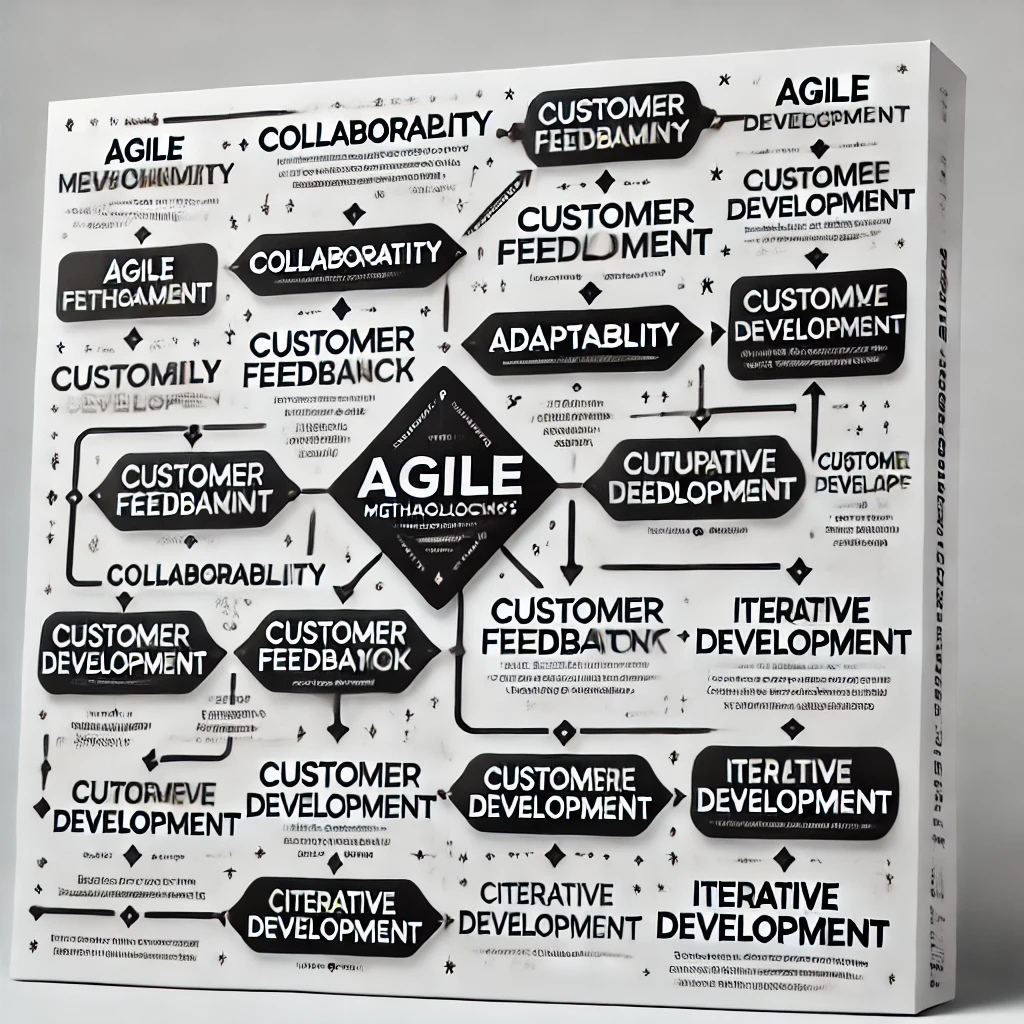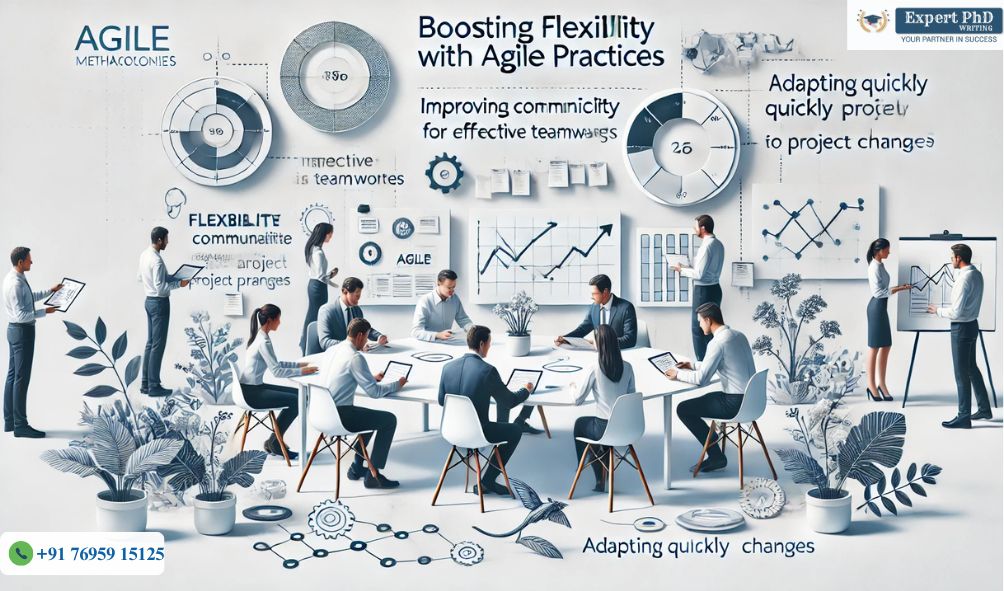Enhancing Team Collaboration and Adaptability
Through Agile Methodologies
Introduction
In a fast-evolving business landscape, companies face the dual challenge of staying flexible and responsive to market shifts. Traditional project management often lacks the agility required to meet these demands, leading organizations to adopt agile methodologies—a compelling approach that fosters collaboration and adaptability in dynamic settings.
While agile practices offer a framework for rapid adaptation, many organizations face obstacles like resistance to change, communication issues, and role ambiguities. For example, Nokia struggled to implement agile effectively, hampering their response to market changes. In contrast, Spotify’s success with agile is notable, as its "squad" model enables fast adaptation and strong collaboration. For researchers or students analyzing such transitions, agile project dissertation help can support the development of well-structured, evidence-based studies. This blog explores how agile methodologies enhance team collaboration and adaptability, providing actionable strategies and real-world examples for organizations aiming to foster a resilient and innovative work environment.
Understanding Agile Methodologies
Agile methodologies are founded on iterative development, emphasizing collaboration, customer feedback, and flexibility. Unlike traditional linear models, agile allows teams to respond promptly to changes. Researchers exploring these frameworks can draw parallels in PhD thesis methodology writing, where adaptability and clarity in structure are equally vital. The Agile methodologies outlines the following four key aspects:
- 1. Individuals and Interactions over Processes and Tools: Prioritizing open communication among team members.
- 2. Working Software over Comprehensive Documentation: Focusing on rapid delivery rather than exhaustive documentation.
- 3. Customer Collaboration over Contract Negotiation: Engaging customers continuously to refine products.
- 4. Responding to Change over Following a Plan: Encouraging teams to adapt strategies as new information arises.
These principles help create a culture where collaboration and adaptability are embedded, enabling teams to navigate complexities effectively.

Enhancing Collaboration Through Agile Practices
Agile promotes collaboration by fostering open communication, cross-functional teams, and regular feedback loops. Key agile practices that enhance collaboration include:
- Daily Stand-ups: Short, focused meetings where team members share updates and discuss challenges. This boosts transparency and alignment, as seen at Atlassian, where daily stand-ups have improved decision-making speed and accountability (Smith & Ruiz, 2020).
-
Cross-Functional Teams: Agile teams are often diverse in skills, promoting an environment where members can leverage each other's strengths. For evaluating team performance, SPSS for agile project data analysis can provide statistical insights to support decision-making (Rožman et al., 2023). Spotify’s cross-functional squads are a prime example, fostering teamwork that leads to innovative solutions.
- Retrospectives: Regular reflections allow teams to assess their processes, celebrate successes, and identify areas for improvement, fostering continuous learning. Retrospectives empower teams to adapt their collaboration strategies over time (Kohn, 2024).
- User Stories and Feedback: Agile encourages teams to create user stories centered on customer needs, refining products based on continuous stakeholder feedback. For instance, Airbnb’s user feedback system has been instrumental in refining their platform and enhancing user experiences.
Case Study: Spotify's Agile Transformation
Spotify’s "squad" model is widely recognized for exemplifying agile success. Each squad operates like a mini-startup, empowered to innovate and make decisions independently. This structure enables Spotify to swiftly adapt to market conditions while maintaining a collaborative and user-focused approach. Their agile framework has driven product innovation and fostered a teamwork-centered culture.
Fostering Adaptability in Teams
Agile methodologies are structured to promote adaptability, encouraging teams to embrace change and respond effectively to new challenges:
-
Iterative Development: Agile projects are divided into short cycles, allowing teams to deliver incremental value and pivot quickly based on feedback. Researchers documenting such rapid adaptations can benefit from an Empirical article writing service to present data-driven insights effectively (Amajuoyi et al., 2024). For example, Zoom adapted rapidly during the pandemic to accommodate increased demand for virtual communication.
- Flexible Planning: Agile values flexible planning, allowing teams to adjust priorities as projects evolve (Balaban & Đurašković, 2021). This adaptability helps organizations stay responsive to shifting requirements without losing momentum.
- Continuous Improvement: Agile encourages a culture of ongoing assessment, where teams strive to improve their processes. Studies indicate that continuous improvement can boost productivity by as much as 20%, enhancing resilience.
- Empowerment and Autonomy: Agile empowers teams to make decisions and take ownership of their work. At Microsoft, for instance, this autonomy has led to innovative outcomes as teams feel encouraged to experiment and embrace change.

Conclusion
Agile methodologies offer a powerful framework for fostering collaboration and adaptability in today’s complex work environment. By prioritizing communication, encouraging cross-functional teamwork, and embracing flexibility, organizations can cultivate a culture that thrives on innovation and resilience. Effective Communication in Project Management plays a crucial role in implementing agile strategies successfully. For companies navigating modern business challenges, agile practices can significantly enhance team performance and foster a more adaptable organizational structure. Learning from examples like Spotify and adopting practical agile strategies can empower organizations to not only meet evolving demands but also seize emerging opportunities. Ultimately, embracing agile methodologies is more than a trend; it’s an essential shift for organizations aiming to succeed in an ever-competitive world.
References
Amajuoyi, P., Benjamin, L. B., & Adeusi, K. B. (2024). Agile methodologies: Adapting product management to rapidly changing market conditions. GSC Advanced Research and Reviews, 19(2), 249–267. https://doi.org/10.30574/gscarr.2024.19.2.0181 (Keyword - Feedback)
Balaban, S., & Đurašković, J. (2021). Agile Project Management as an Answer to Changing Environment. European Project Management Journal, 11(1), 12–19. Researchgate. https://doi.org/10.18485/epmj.2021.11.1.2 (Keyword - Flexible Planning)
Kohn, P. (2024). Reflection and Self-Awareness: Cultivating Effective Leadership Mindset. Emerald Publishing Limited EBooks, 91–118. https://doi.org/10.1108/978-1-83549-564-320241007 (Keyword - Collaboration)
Rožman, M., Tominc, P., & Štrukelj, T. (2023). Competitiveness Through Development of Strategic Talent Management and Agile Management Ecosystems. Global Journal of Flexible Systems Management, 24(3), 373–393. Springer. https://doi.org/10.1007/s40171-023-00344-1 (Keyword - Diverse in Skills)
Smith, S. M., & Ruiz, J. (2020). Challenges and Barriers in Virtual teams: a Literature Review. SN Applied Sciences, 2(6), 1–33. Springer. https://doi.org/10.1007/s42452-020-2801-5 (Keyword - Focused Meetings)



